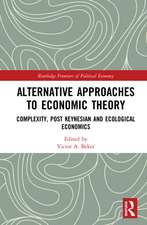Economics as Social Science: Economics imperialism and the challenge of interdisciplinarity: Routledge Advances in Social Economics
Autor Roberto Marchionatti, Mario Cedrinien Limba Engleză Hardback – 25 oct 2016
This book focuses on a territory that persists to be largely intractable using the postulates of economics: that of primitive societies. In retracing the origins of economics imperialism back to the birth of the discipline, this volume argues that it offers a reductionist interpretation that is poor in interpretative power. By engaging with the neglected traditions of sociological and anthropological studies, the analysis offers suggestions for a more democratic cooperation between the social sciences.
Economics as Social Science is of great interest to those who study history of economic thought, political economy and the history of economic anthropology, as well as history of social sciences and economic methodology.
| Toate formatele și edițiile | Preț | Express |
|---|---|---|
| Paperback (1) | 384.27 lei 6-8 săpt. | |
| Taylor & Francis – 28 noi 2019 | 384.27 lei 6-8 săpt. | |
| Hardback (1) | 1000.27 lei 6-8 săpt. | |
| Taylor & Francis – 25 oct 2016 | 1000.27 lei 6-8 săpt. |
Din seria Routledge Advances in Social Economics
-
 Preț: 386.77 lei
Preț: 386.77 lei -
 Preț: 310.08 lei
Preț: 310.08 lei - 18%
 Preț: 998.77 lei
Preț: 998.77 lei -
 Preț: 489.26 lei
Preț: 489.26 lei -
 Preț: 284.78 lei
Preț: 284.78 lei -
 Preț: 395.90 lei
Preț: 395.90 lei -
 Preț: 464.54 lei
Preț: 464.54 lei -
 Preț: 420.34 lei
Preț: 420.34 lei -
 Preț: 493.34 lei
Preț: 493.34 lei -
 Preț: 469.34 lei
Preț: 469.34 lei - 17%
 Preț: 257.68 lei
Preț: 257.68 lei -
 Preț: 389.38 lei
Preț: 389.38 lei -
 Preț: 471.33 lei
Preț: 471.33 lei - 17%
 Preț: 222.06 lei
Preț: 222.06 lei -
 Preț: 486.17 lei
Preț: 486.17 lei -
 Preț: 487.44 lei
Preț: 487.44 lei -
 Preț: 415.67 lei
Preț: 415.67 lei - 18%
 Preț: 1002.63 lei
Preț: 1002.63 lei -
 Preț: 468.36 lei
Preț: 468.36 lei - 15%
 Preț: 425.62 lei
Preț: 425.62 lei - 17%
 Preț: 269.39 lei
Preț: 269.39 lei - 13%
 Preț: 337.39 lei
Preț: 337.39 lei - 15%
 Preț: 428.00 lei
Preț: 428.00 lei -
 Preț: 447.51 lei
Preț: 447.51 lei -
 Preț: 449.41 lei
Preț: 449.41 lei -
 Preț: 384.27 lei
Preț: 384.27 lei - 26%
 Preț: 848.93 lei
Preț: 848.93 lei - 18%
 Preț: 1387.62 lei
Preț: 1387.62 lei - 18%
 Preț: 1060.25 lei
Preț: 1060.25 lei
Preț: 1000.27 lei
Preț vechi: 1219.84 lei
-18% Nou
Puncte Express: 1500
Preț estimativ în valută:
191.42€ • 199.60$ • 159.09£
191.42€ • 199.60$ • 159.09£
Carte tipărită la comandă
Livrare economică 20 martie-03 aprilie
Preluare comenzi: 021 569.72.76
Specificații
ISBN-13: 9781138909298
ISBN-10: 1138909297
Pagini: 228
Dimensiuni: 156 x 234 x 18 mm
Greutate: 0.45 kg
Ediția:1
Editura: Taylor & Francis
Colecția Routledge
Seria Routledge Advances in Social Economics
Locul publicării:Oxford, United Kingdom
ISBN-10: 1138909297
Pagini: 228
Dimensiuni: 156 x 234 x 18 mm
Greutate: 0.45 kg
Ediția:1
Editura: Taylor & Francis
Colecția Routledge
Seria Routledge Advances in Social Economics
Locul publicării:Oxford, United Kingdom
Public țintă
Postgraduate and UndergraduateCuprins
INTRODUCTION PART I AT THE ROOTS OF ECONOMICS IMPERIALISM. CLASSICAL AND NEOCLASSICAL ECONOMICS AND THE ISSUE OF PRIMITIVE SOCIETIES1 The distant origins of economics imperialism. Classical economists and primitive societies2 Economics imperialism revealed. Neoclassical economists and the primitive man3 Primitive society in the interpretation of classical and neoclassical economics: a common modelPART II ECONOMICS AND THE CHALLENGE OF PRIMITIVE SOCIETIES: ANTHROPOLOGICAL NON-FORMALIST APPROACHES4 The primitive system of gift-exchange discovered: Marcel Mauss’s Essai sur le don 5 The substantivist perspective on the role of the economy in societies: Karl Polanyi’s and Marshall Sahlins’s contributions6 The intelligibility of primitive economic organization: Sahlins, Lévi-Strauss and Clastres on Mauss’s political philosophyPART III THE PROBLEM OF THE ‘OTHER’: ECONOMICS AND UNSELFISH BEHAVIOR 7 Economics on altruism, giving and reciprocity 8 A unified framework for behavioral sciences? On Herbert Gintis’s proposalPART IV THE THEORETICAL AND PRACTICAL RELEVANCE OF MAUSS’S GIFT TO THE DEVELOPMENT OF A NON-IMPERIALIST ECONOMICS9 The gift in social sciences10 Mauss’s research programme revisited: the Mouvement anti-utilitariste dans les sciences sociales (M.A.U.S.S.)11 A new Maussian perspective in economicsCONCLUSIONS
Descriere
This book focuses on a territory that persists to be largely intractable using the postulates of economics: that of primitive societies. In retracing the origins of economics imperialism back to the birth of the discipline, this volume argues that it offers a reductionist interpretation that is poor in interpretative power. By engaging with the neglected traditions of sociological and anthropological studies, the analysis offers suggestions for a more democratic cooperation between the social sciences.











